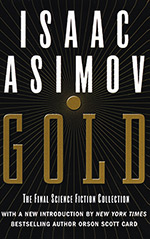
![]() Sable Aradia
Sable Aradia
11/20/2017
![]()
Read for the Genre Non-Fiction and the Collections! Reading Challenges.
This collection represents the last batch of stuff that Isaac Asimov gave to us. Half of it is stories, and the other half is a collection of essays about science fiction and writing in general that he produced, mostly as editor of some of the most legendary sci-fi magazines ever. As a result, it qualified for both a short story collections reading challenge and a genre-related non-fic challenge that I was doing, and I counted it for both.
This is going to be a short review because, in a nutshell, you can see why Asimov remains a legend. He was a master of his craft, and this writing spanned the breadth of his illustrious, long career.
I enjoyed his non-fiction writing immensely. He was a thoughtful, intelligent man with a self-deprecating, dry wit that I think tickles my Canadian sense of humour especially well. He was also capable of doing a great thing that I admire in intellectuals; he was capable of thinking harder about an issue and then changing his mind! Asimov is somewhat infamous for having directly contributed, for example, to the stereotype against women writing sci-fi. In one of these essays he apologizes and confesses that this view was mostly was the result of having been told this by people he admired when he was still a young writer, and he clearly begins to change his approach, including his use of pronouns in the course of these ongoing essays. I learned an amazing amount about the genre and its evolution through his eyes.
The short stories were like reading liquid light. I had forgotten, since it's been a while since I'd read Asimov, what an amazing storyteller he could be. As a reader, I felt his prose flowed like magic. His stories were all page-turners that left me feeling satisfied, whether it was a light snack (there's a couple of three-page stories) to a full meal deal (Gold, the title story).
And as a writer, I know enough about the craft to recognize the technical minutiae of his style and the way he told his stories, and I think I learned some things by watching this master at work that might help me to write better short stories.
Why did it take me so long to read it? I started with the non-fiction, and I tend to read non-fiction in snippets, and also the book was misplaced for a while. When I got into the fiction, I couldn't put it down. Don't think the long reading time is in any way a comment on its quality!
A must for anyone who considers themselves a sci-fi fan, and recommended for anyone else also.
http://dianemorrison.wordpress.com